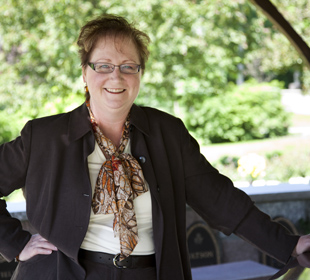Professor Neilson's class rules: ask questions and have fun

Like any good marketer, Leighann Neilson has always asked a lot of questions about the world around her.
Such as: “are online communities real communities?” (Her research topic while completing her undergraduate degree in Carleton’s Directed Interdisciplinary Studies program).
Or: “how do professional wrestling fans make moral decisions?” (The topic of her PhD dissertation at Queen’s University.)
And now, as an Associate Professor of Marketing at the Sprott School of Business, Neilson gets to answer the question: “how do you teach a course about a field that is constantly changing?”
With the Internet presenting a whole host of new tools for marketers, keeping things current can present a challenge.
“Personally, I think there’s nothing that hasn’t already been taught by Star Trek,” she says with a laugh.
But whether the topic is Captain Kirk or the challenges of marketing in an online world, Neilson teaches with a sense of humour and a philosophy that says “learning doesn’t have to hurt.”
“It might be kind of selfish, but I think if I’m not having fun in the class, then there’s no point for me to be there,” she says. “If I’m not having fun, then the students probably aren’t having fun either and that’s painful.”
Neilson was recently honoured with a 2011 Capital Educators’ Award, an award for excellence in teaching and acting as a positive role model. The Capital Educators’ Awards were inspired by a group of business and education leaders who wanted to raise the profile of public education and to recognize and celebrate the dedication and achievements of our local educators.
Neilson says she tries to teach her courses in a way that engages students from a variety of business concentrations.
“Even when I have a class full of accounting and finance students, they still have to reach their customers somehow,” she says. “Marketing is a part of life, it’s all around you and it has to make sense for you.”
One of the teaching methods Neilson has used had students participating in the Google Online Marketing Challenge, where students are given $200 dollars worth of online advertising with Google AdWords.
The students then use that money to run a marketing campaign for a local non-profit organization.
Through projects like these, Neilson says students are able to learn about the new challenges that exist for marketers online, including how social media changes company and consumer communication.
But despite all the changes marketing has undergone in a world of tweets and e-commerce, Neilson does have one piece of time-honoured advice for students:
“Go to the library,” she says bluntly.
“People think they can get everything they need to know online now, but that’s not true,” she says. “When you’re a student, you’re a part of this wonderful university environment. If you don’t take advantage of every resource that you can, you’re not getting the full value.”
Through using the resources available to them, Neilson says students can learn to question the information presented to them.
“You don’t have to swallow something just because it’s in the textbook you had to buy,” she says. “You’re allowed to challenge and think for yourself and in the end I think that makes you a better marketer.”
Written by: Mitchell Vandenborn